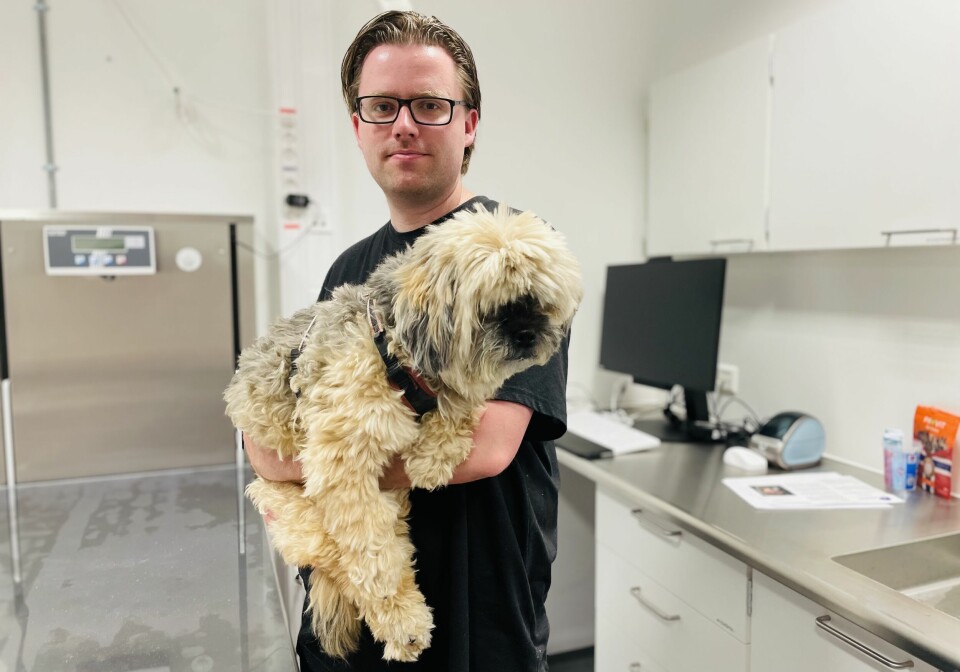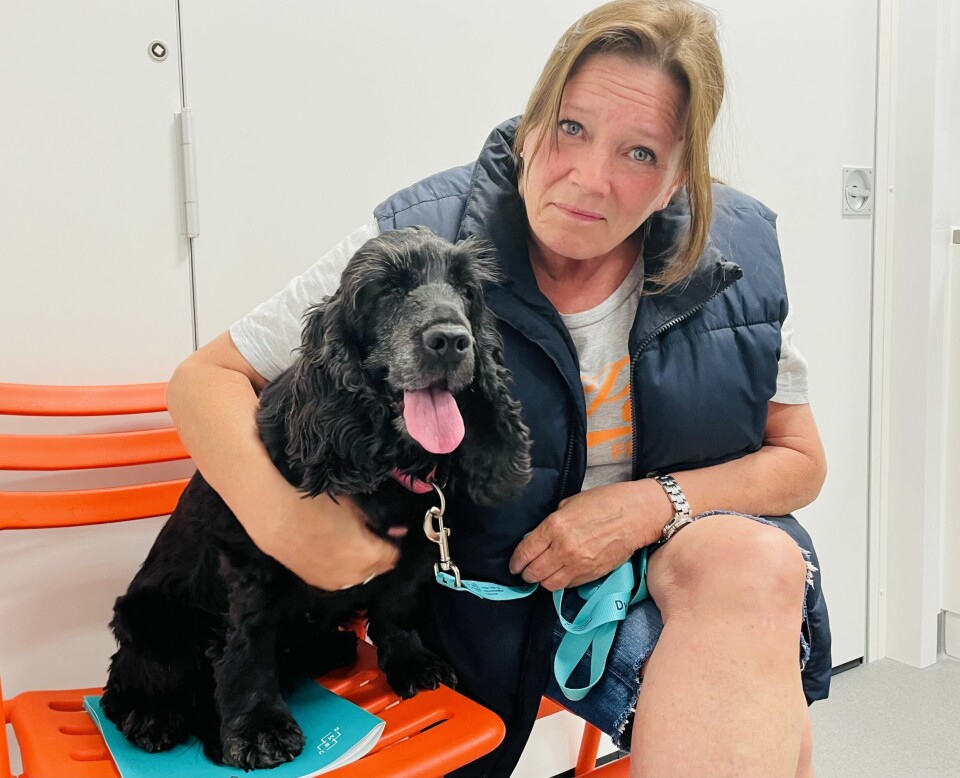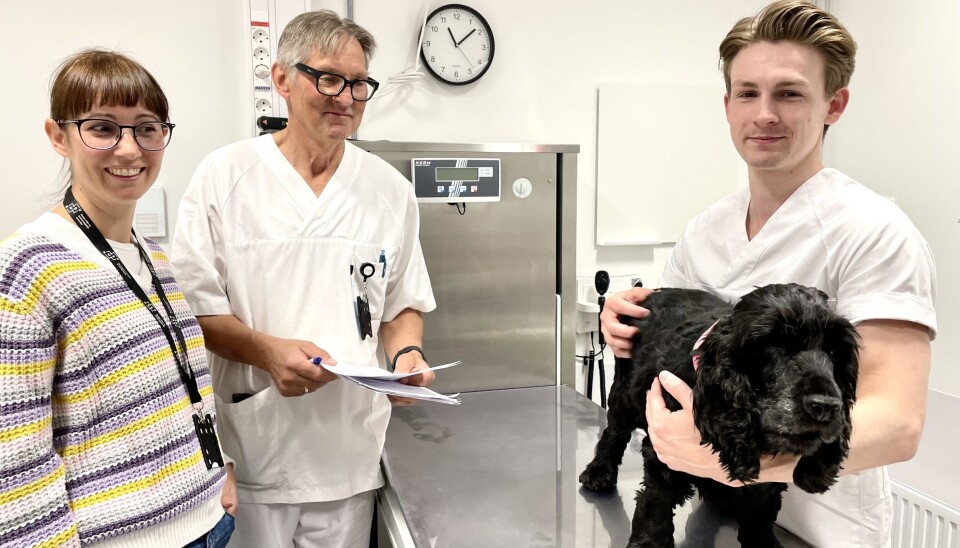
Mark drove from the Netherlands to Norway for a new cancer treatment to save Misty the dog
Mark Klaver has travelled from the Netherlands to Norway five times so that his dog Misty (12) can receive a new immunotherapy cancer treatment. Misty is participating in an experimental trial at the Veterinary College that could extend dogs' lives.
Mark Klaver (30) is sitting at the animal hospital at the Veterinary College in Ås, outside Oslo. His dog Misty is on his lap.
She is about to receive her sixth dose of a new, experimental immunotherapy cancer treatment at the Norwegian University of Life Sciences (NMBU).
“I want to do everything I can to ensure that she lives as long as possible, as long as she feels fine,” Klaver says to sciencenorway.no.
That’s why he's driven the 20-hour round trip from the Netherlands to Ås several times, in the hope that Misty will live longer.
Jaw surgery
Mark was 18 years old when he got Misty, a mixed breed, as a puppy. She is a Maltese-Shih Tzu mix.
One day he spotted a tumour in Misty's mouth. It was a form of skin cancer, melanoma, which can occur in the mucous membranes of dogs.
The cancer had spread to the jaw, and the dog had an operation in the Netherlands. A bit of her lower jaw bone was removed.
She still manages to eat normally.
But then the cancer spread to her lungs.
Answered a Norwegian advertisement
Mark Klaver googled possible treatment options. He tried to get her into a Dutch study but was turned down.
Then he discovered that the Veterinary College at Ås was looking for dog patients whose cancer had spread to their lungs.
“I had no doubt whatsoever about taking the opportunity and drove to Norway to get free treatment,” Klaver said.
It's been 12 weeks. After the most recent fifth dose, he rented an AirBnB apartment nearby to avoid the long journey. He has been working from there for two weeks.
The tumours have shrunk
“Misty is tolerating the treatment well, with few side effects. She may have been a little tired and breathing a little more rapidly than usual,” Klaver said.
The question now is whether the treatment works well. If the cancer is not under control, the next resort is in the US, and that is expensive.
“At the previous check-up, it seemed that the tumours had shrunk,” Klaver said optimistically.
Veterinarian and professor emeritus Lars Moe at the Veterinary College at NMBU confirmed that Misty is responding well to the treatment. Moe is at the forefront of the trial project.

Joy, a cocker spaniel is also involved
Joy (11), a dog from Oppegård, a suburb just outside Oslo, is also involved in the trial. She has had several operations for mammary cancer. But then it subsequently spread to her lungs.
“My husband and I want to do everything for her to get well, but we don’t want her to suffer,” owner Ragnhild Tingstadengen said.
She got a tip about the NMBU experiment from her vet, after Joy was operated on for mammary cancer twice at the animal hospital in Fredrikstad.
“We cannot imagine a life without her,” she says.
Joy is an important part of the Tingstadengen family, as well as for their sons and grandchildren.

Stimulates the immune system
The new treatment Misty and Joy are receiving is aimed at stimulating the immune system to fight the cancer, Moe said.
“We want to provoke an inflammatory condition that shows that the dogs' immune system is attacking the cancer,” he explains.
The project is a collaboration with a biotechnology company.
Cancer grows when the immune system fails to notice that something abnormal is going on. Many cancer cells are masters at downregulating the normal immune response and thus "hiding" from our immune cells, Moe said.
Must be safe and effective
“For now, we are in the initial phase. The first goal is to assure ourselves that the treatment is safe, that it does not produce dangerous side effects,” Moe said.
At the same time, the treatment must also achieve an effect by keeping the cancer at bay, either by arresting the tumours’ growth and spread, or by completely eliminating the cancer or beating it back.
That's why blood samples have been taken from Joy and Misty during the 12-week course to check the dogs’ liver and kidney function. A number of other signalling molecules, called interleukins, will also be analysed.
“This is to check that we are getting a proper response from the immune cells. In Misty, one interleukin has dropped by 75 per cent, which indicates a response and that cancer cells in the lungs are being destroyed,” Moe said.
The goal is that they not die from cancer
In addition, the dogs' tumours, both their size and spread, are measured with ordinary X-rays and CT scans.
“If we succeed, the dogs may live for several more months or years before they die. The goal is for them to die with cancer, and not from cancer,” Moe said.
He strolls over to Mark Klaver after Misty’s X-ray examination.
“It seems that the treatment has had a good effect on your dog. The tumours in the lungs have partly regressed and partly stopped growing,” he says.
Mark Klaver looks relieved, but doesn't dare to celebrate just yet.
Will be a sensation
In order to achieve a balance between side effects and a helpful effect, the researchers have adjusted the dose that Misty and Joy receive. The trick will be to create a cocktail that has an effect without the side effects being too harsh.
“Since the preliminary project shows a surprisingly good effect, without such serious side effects, we will start a larger study that will be controlled,” Moe said.
But the study will not be randomized, because the researchers have no "normal" standard for cancer treatment for dogs today.
If they succeed, it will be a sensation, he says.
The immunotherapy will then be made available on a broad basis and offered to dogs whose cancer has spread to the lungs, to the delight of many desperate dog owners throughout Europe.

Several cancer drugs under development
The veterinary college is also working on two other cancer treatments for dogs. These treatments target three to four types of cancer in the body which are currently difficult to treat, if surgery is not enough.
One is a dendritic cell vaccine, which is designed to cause other immune cells to jump into action.
A total of 30 dogs with mammary cancer and soft tissue cancer will take part in this study. This latter cancer is cancer in connective tissue or muscles.
The experimental treatments will begin as soon as the researchers get approval for the production and treatment from the Norwegian Medicines Agency. They already have approval from the Norwegian Food Safety Authority and NMBU.
The third cancer treatment is also a form of immunotherapy.
“All these treatments target all forms of organ cancer that are not blood cancer or lymph cancer,” Moe said.
Could eventually be used on humans
Professor Moe hopes that the outcome of these immunotherapies can also benefit people in the long term.
“Dogs are much more like people than mice are. That means our research will have much greater transfer value if we find out that these medical treatments work,” he said.
Laboratory mice have immune systems that are often knocked out, and are bred in a way that makes them molecularly very different from humans, he said.
Treatment that shows promise in mouse models with transplanted human cancer cells often doesn’t work when transferred to a real cancer patient. That’s been demonstrated by medical research, Moe said.
Studies that show that something has an effect on cancer in mice are consequently less useful when the principles behind the treatment and the medicines themselves are used in humans.
Dogs more like people
Cancer in both humans and dogs is a very complex disease where there are many mutations in genes that regulate a wide range of the body systems.
The cancer cells regulate the immune system's response to the abnormal cells by "turning off" a normal inflammatory reaction. That also prepares normal organs such as the lungs or liver for the cancer’s spread.
In inbred mice that are given human cancer cells, the mouse's own immune system will not respond, because it doesn’t work.
Dogs with spontaneously occurring cancer, on the other hand, are similar to humans with the corresponding cancer, because the whole animal is affected by the cancer.
The National Cancer Institute in the USA has therefore now used dogs with cancer that has spontaneously occurred in the brain or bones to find effective human treatments.
Expensive study
The projects are being carried out in collaboration with the biotechnology company Alv B AS, which is covering expenses and has applied for a patent for the invention.
“There are many people who are involved in this, and just a CT examination costs several tens of thousands of kroner. The blood test analyses and the drugs are also expensive,” Moe said.
As soon as the company has received a patent, the group will publish the results in an academic journal.
Translated by: Nancy Bazilchuk
Read the Norwegian version of this article on forskning.no
Reference:
A.K. LeBlanc et al.: Creation of an NCI comparative brain tumor consortium: informing the translation of new knowledge from canine to human brain tumor patients. Neuro Oncology, 14. May 2016.



































